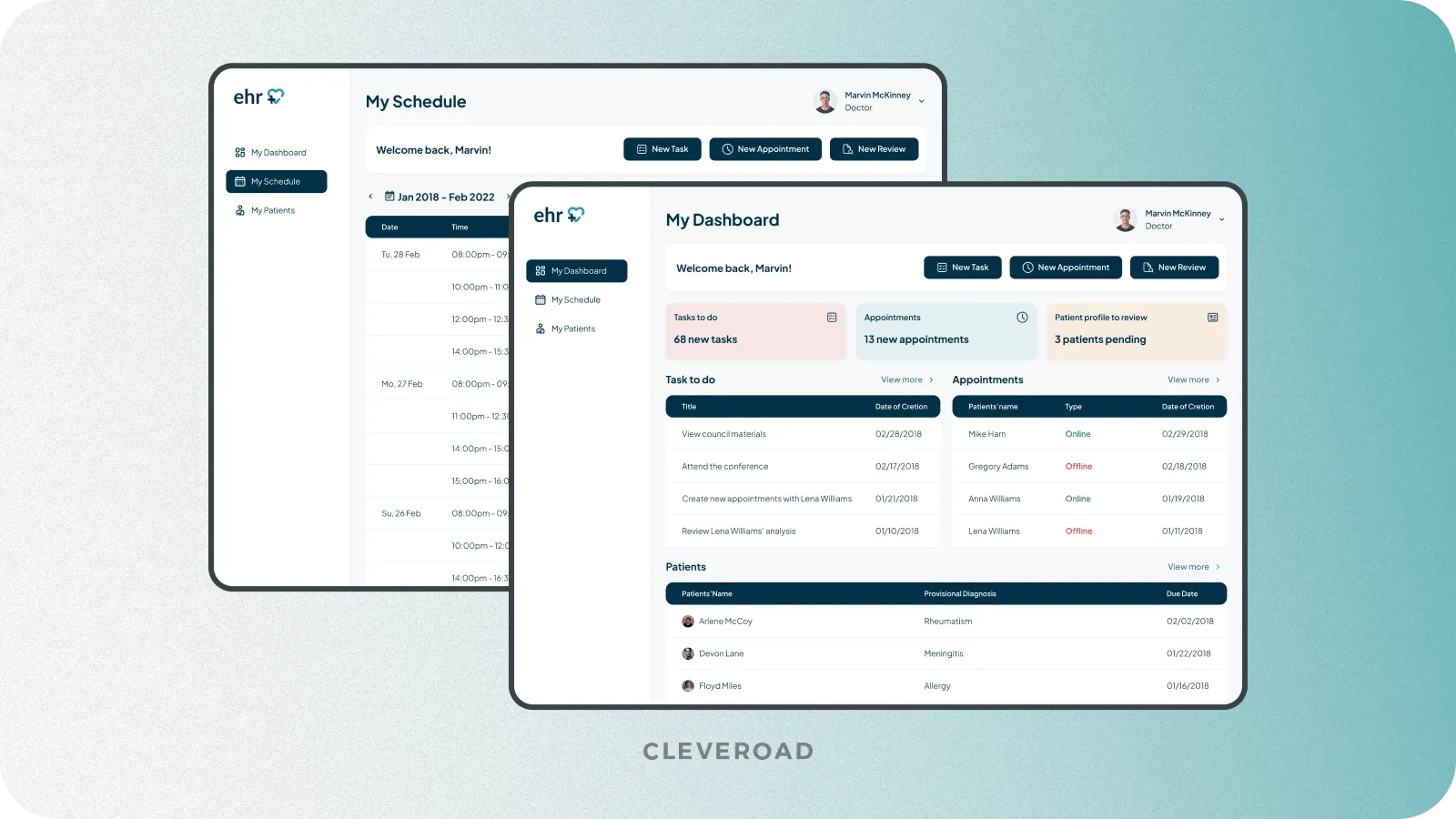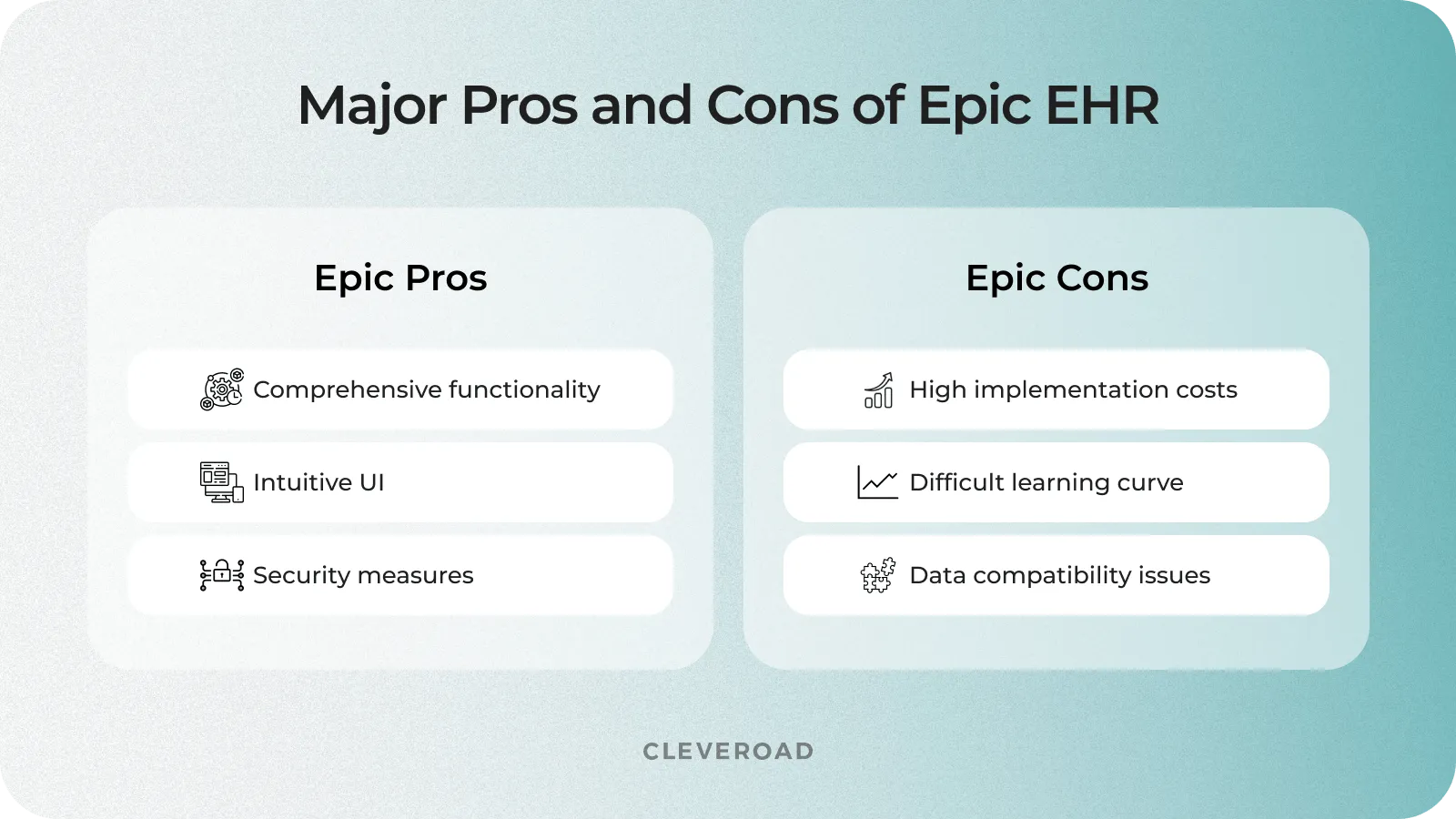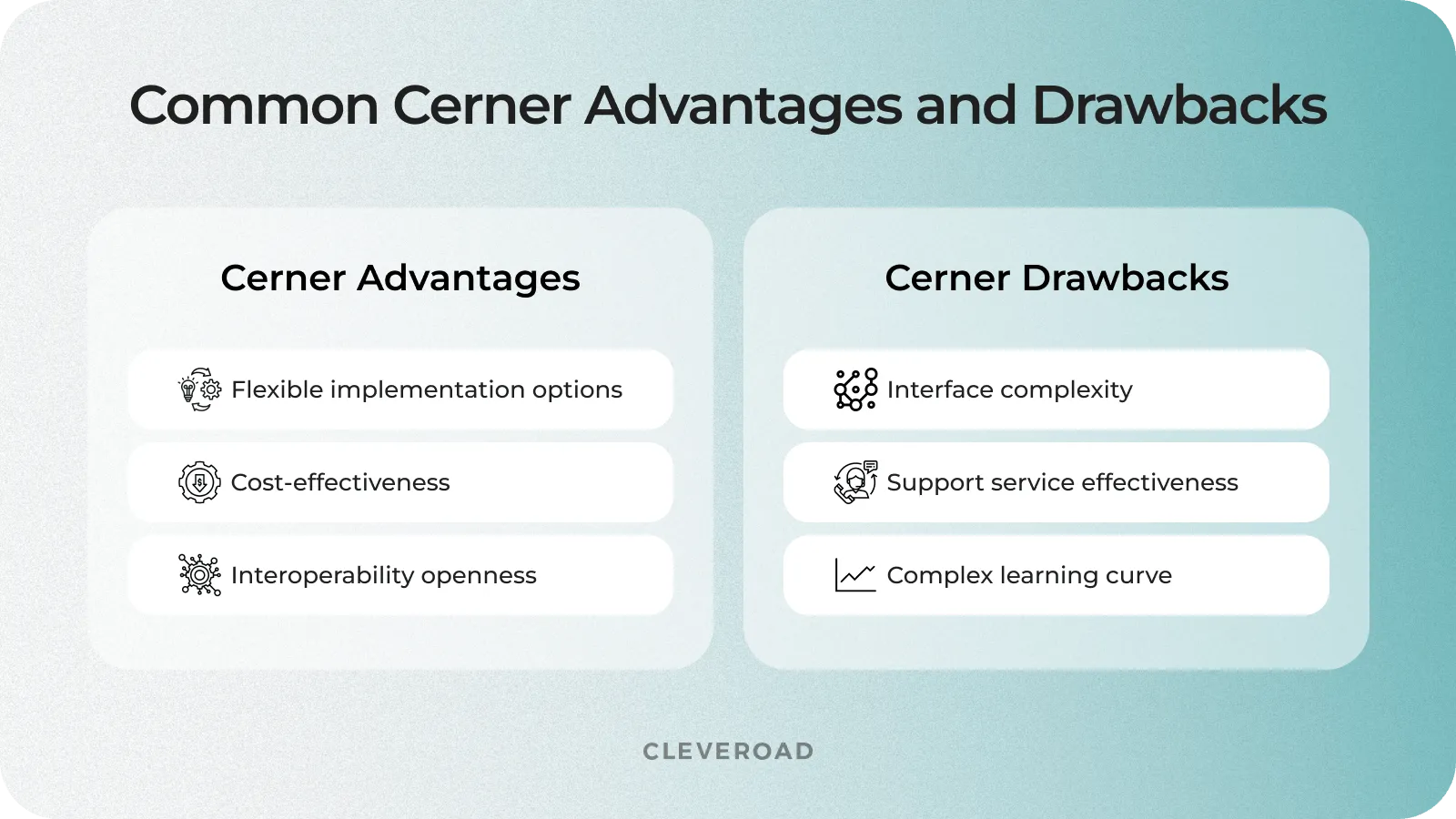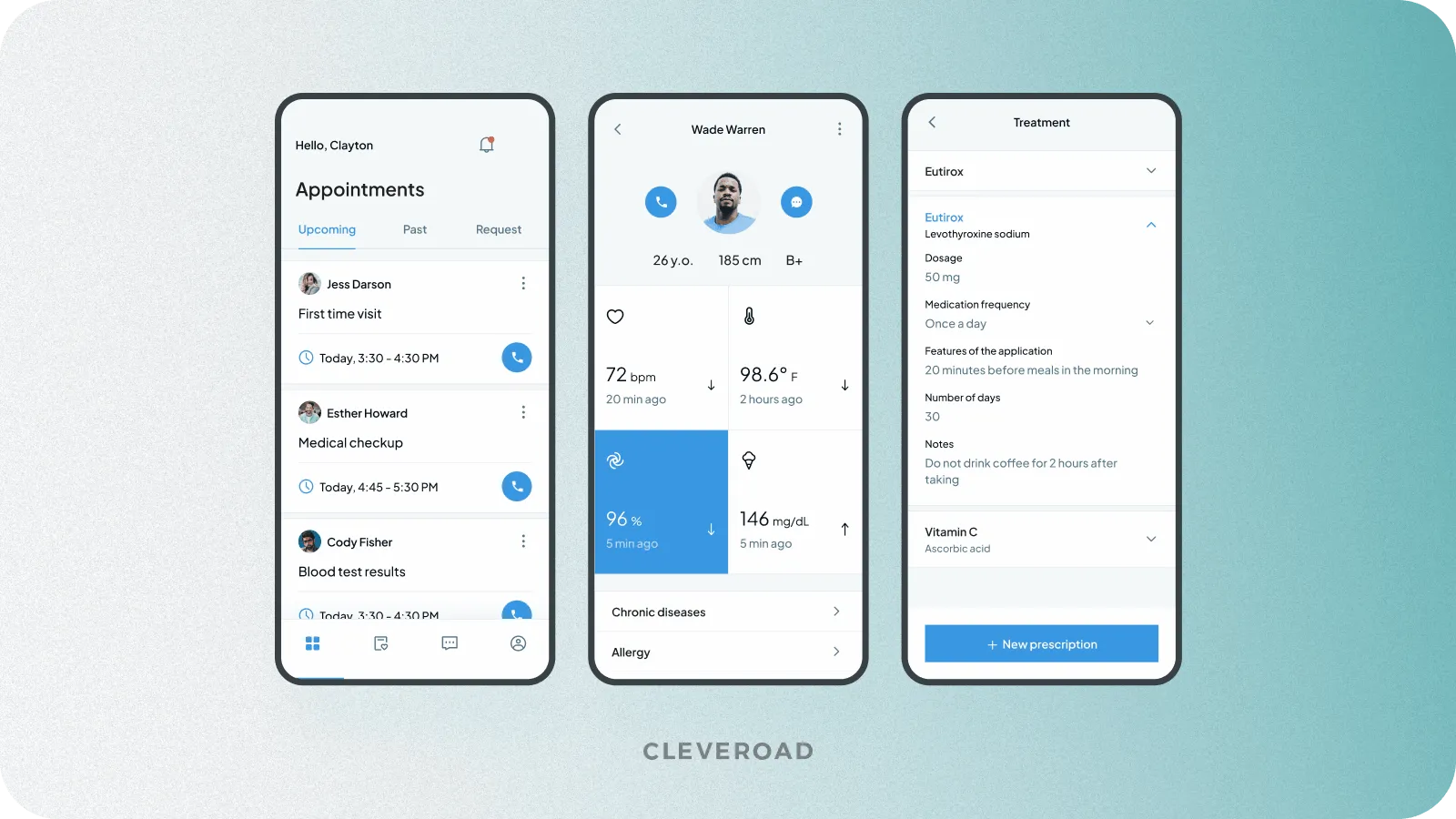Epic vs Cerner: What Is the Best Option for Your Healthcare Business
03 Jan 2024
13 Min
301 Views
Epic and Cerner – what will be the best EHR system to manage patient data? Making a choice of the right health data management system for your healthcare facility might be challenging. Each of the mentioned solutions has its own pros and cons and ways to operate with medical information.
As an experienced healthcare software development company, we’ve compared Cerner vs Epic EHR, reviewing their advantages and drawbacks, and disclosing the most cost-effective option.
What is the Difference Between Epic and Cerner?
Epic and Cerner are both Electronic Healthcare Record (EHR) systems known for their extensive feature set to deal with patient records and medical data. Epic is recognized for their easy-to-navigate user interface, whereas Cerner offers more streamlined, safe and secure access to patient data. They both are quite popular among the hospitals to manage patient data: for example, according to the Atlas Technology Install Dataset from Definitive Healthcare, Epic systems vs Cerner are the most popular EHR vendors in the US, and their systems are being installed 2709 and 1576 times respectively Becker Hospital Review mentions that Epic was an EHR market leader in the US in 2022 with the hospital market share of 35,9% when Cerner had 24,9%.
Now, we'll delve deeper into the major differences of Epic versus Cerner to help you make a thoughtful decision when picking an EHR/EMR system.
User size and type
Both the Epic/Cerner EHR vendors offer cloud-based software for the patient ambulatory care in hospitals and healthcare centers. Epic electronic health record system tends to be favored by medium to large-scale medical facilities due to its robust and comprehensive features. These medical organizations often have a complex infrastructure that benefits from scalability and integration capabilities of Epic EHR system.
On the other hand, Cerner, still popular in medium-sized health organizations, is particularly well-suited for small to medium-scale healthcare settings. The vendor offers tailored solutions covering their operational needs and ensuring their patient data security.
Interoperability
Epic users often consider the system as a closed one, while it receives criticism for its limited interoperability. But, it provides improved connectivity when we compare Cerner with it due to a direct protocol connection feature.
Cerner EHR has got the following tools to maintain its interoperability:
- Cerner Ignite APIs – third-party integrations simplifying data management for healthcare staff
- Oracle Health Seamless Exchange – tool to compare information about patients from different EHR resources and delete health data duplicates
- Cerner Interoperability Ticker – instrument for monitoring medical data exchange
Epic, in its turn, increases their systems interoperability with IRIS Data Platform to provide bigger datasets for customers, CareEverywhere feature to exchange health information, or Epic Interconnect tool to streamline users’ work with data.
Both Cerner vs Epic EHR continue to work towards improving interoperability, aiming to facilitate better care coordination and share everywhere data across the healthcare landscape. The choice between the two often hinges on the specific needs and priorities of healthcare organizations in their pursuit of seamless information exchange.
Navigation
Epic tries to make their solutions easy to navigate for users, but faces challenges in creating a user-friendly interface due to its extensive feature set. In its turn, Cerner's new EHRs and EMR systems are HIPAA-compliant software with a secure messaging application that simplifies communication between patients and doctors. However, due to the Cerner navigation complexity, it is recommended for the medical staff to receive training until they are fully competent in using Cerner EHR.
So, in an Epic comparison, Cerner would be a suitable choice if you need a straightforward and user-friendly EHR with basic capabilities. Epic EHR has a complicated UI/UX but can function adequately with advanced features.

Example of EHR interface developed by Cleveroad
Client support
If we compare Cerner and Epic EHR in terms of client support, we can see that Cerner users support team is available around the clock. However, their efficiency could be improved, as they take longer to reverse their actions. Epic also provides a phone number and their client support specialists usually respond within 24 hours. Given the quicker response time, Epic appears to be the better choice in this situation. However, it is important to consider your company's requirements and financial capabilities when making decisions about technology solutions.
The decision-making process as to choosing Cerner vs Epic EHR software integration should involve a thoughtful evaluation of various parameters, including user size, pricing, navigation challenges, and client support efficiency to align with the specific requirements of healthcare organizations.
Cerner vs Epic: Pros and Cons
Cerner and Epic are two systems possessing many similar features, like revenue cycle management, interoperability, mobile access, artificial intelligence, and telemedicine software integration, which can help reduce healthcare software costs. However, to make a choice between these two EHRs and answer the “which is better: Epic or Cerner” question, you should consider their pros and cons.
The pros and cons of Epic EHR to weigh out
The Epic major advantages are the following:
Comprehensive functionality. Epic is known for offering a comprehensive suite of features that cover a wide range of healthcare needs. From patient records and clinical documentation to billing and reporting, Epic provides an integrated solution that streamlines clinic workflows.
Intuitive UI. The system employs an appealing design with color-coded visualizations, making it easier for healthcare professionals to navigate and interpret patient information.
Security measures. To ensure the protection of patient information and maintain the confidentiality of medical records, the platform utilizes robust security measures, including multi-factor authentication and regular security updates.
The following disadvantages are associated with Epic:
High implementation costs. The investment required for hardware, software, and training can be substantial, making it a less favorable option for smaller healthcare organizations with limited budgets.
Learning curve. Despite its user-friendly design, Epic's extensive feature set can contribute to a learning curve for new users. Training and onboarding may take time, impacting initial productivity as healthcare professionals become accustomed to the system.
Data compatibility. If the data formats within the Epic ecosystem diverge, it can impede seamless communication and interoperability between different components of the EHR. This can lead to potential disruptions in healthcare workflows, hindering the efficient exchange of patient information and compromising the overall effectiveness of the EHR system.

Epic EHR pros and cons to think out
The advantages and drawbacks of the Cerner health system
Continuing the Epic versus Cerner discussion, let’s find out the common advantages and disadvantages set you can face using Cerner software.
So, you should use Cerner solutions because of:
Flexible implementation options. Cerner allows healthcare organizations to customize their systems to better fit facilities’ specific workflows and preferences. This flexibility can be advantageous for organizations with unique requirements.
Cost-effectiveness. Cerner solutions are often considered more cost-effective when compared to Epic software, particularly for smaller healthcare organizations. Particularly, Cerner platforms provide a variety of pricing options, making it accessible for a range of budgets, and it is known for delivering value for the associated costs.
Open approach to interoperability. Cerner also provides Cerner Ignite APIs and Oracle Health Seamless Exchange. This openness facilitates data exchange and collaboration with other healthcare systems.
To make an informed decision as to Cerner vs. Epic choice, you should also think about the disadvantages of Cerner:
Interface complexity. Some users have reported challenges with the user interface of Cerner EHR. Navigating certain pages and features may be less intuitive for some healthcare professionals, requiring additional training to ensure efficient use of the system.
Support service efficiency. While Cerner provides around-the-clock customer support, users may have expressed concerns about the efficiency of their support services. Moreover, response times and issue resolution can vary, impacting the overall user experience.
Learning curve. Some features from Cerner's functionality set are complex (e.g., PowerChart navigation and customization, clinical documentation, medication management, etc.), particularly for those unfamiliar with the system. That’s why, training and ongoing support are crucial to overcoming this challenge and maximizing the system's benefits.

Major advantages and disadvantages of Cerner EHR
In order to choose the most effective healthcare software solution to integrate with your medical systems, you should analyze the most common pros and cons of Epic/Cerner health data administration systems. However, in most cases, it's better to develop a bespoke EHR/EMR system fitting your healthcare business workflows, notably if you offer health services for a particular medical domain like mental health or oncology.
Cerner vs Epic: Which Is More Cost-Efficient
Cost-effectiveness is one of the most important factors the majority of healthcare facilities focus on. The cost of implementing and maintaining EHR systems like Cerner vs. Epic generally includes setup, maintenance, and hardware updates, as well as chosen functionality and number of system users.
The exact Epic and Cerner EHR pricing is not mentioned on their websites, however, we’ve conducted our own research which resulted in the following common points in average price formation of these two systems discussed below.
Average costs for Epic use
The pricing for Epic cloud-based EHR/EMR systems varies depending on the functionality available, ranging from $200 to $35,000 per month. The expenses cover setup and training. On the other hand, some vendors may require an additional fee for training that could exceed $2,000.
Additionally, the cost of a self-hosted Epic EMR can vary significantly, ranging from $1,200 to $500,000 for major hospitals and clinics. Apart from the listed pricing, Epic EMR can be purchased at various prices starting from $1200 and going up to $500,000 or higher.
Approximate pricing for Cerner
The pricing plan for Cerner is lower than that of Epic. The starting cost for Cerner PowerChart Ambulatory EHR is $25 per user per month, which is influenced by multiple factors. It is important to note that Cerner’s EHR does not offer a trial or free version.
Considering the additional costs associated with implementation and installation, the Cerner EHR software is considered more affordable. In contrast, the Epic platform provides greater value.
The use price is an essential factor while making a choice between Epic and Cerner EHR, as it directly impacts the overall financial feasibility and sustainability of implementing an electronic health record system. Evaluating the use price is crucial for healthcare organizations to align their budgetary constraints with the capabilities and features offered by these electronic health record systems, ensuring a judicious investment that meets both short-term needs and long-term strategic objectives in delivering quality patient care.
Sometimes, it is better to create a custom EHR solution, since such decision is more beneficial in the long-term. You can find out how much does it cost to implement an EHR system in our detailed article.
Which is Better Epic or Cerner: Comparison
To make your choice between Epic and Cerner easier, we’ve prepared a list of top 9 points you should pay attention to while thinking out the options.
1. Adaptability to medical facilities needs
Healthcare specialties have diverse needs, and the adaptability of an EHR system to specialized requirements is crucial. Epic is renowned for its capacity to cater to a wide range of medical specialties, with a bunch of specialized healthcare modules. Cerner may be perceived as more adaptable for general medical practices, making it an efficient choice for organizations with less diverse medical specialties.
2. Customization capabilities
Both Epic and Cerner provide customization features, but the extent and ease of customization can vary. Epic is recognized for its highly customizable interface, allowing extensive tailoring to meet the unique workflow requirements of diverse medical specialties. Cerner, while still offering customization options, is often appreciated for its user-friendly and straightforward approach, making it accessible for organizations with varying levels of IT expertise.
Explore how we created a custom Clinical Management system with a robust EMR module for a rehab service provider!
3. Regulatory compliance
Both Cerner and Epic EHRs are designed with compliance in mind, adhering to various industry standards and regulations. Epic's comprehensive approach ensures compliance across a spectrum of clinical requirements, while Cerner's modular design allows organizations to focus on specific compliance needs, providing flexibility in addressing regulatory challenges.
4. Support and maintenance
The level of support and maintenance required can influence the overall success of an EHR system. Epic's nature may necessitate robust ongoing support, which can be resource-intensive. Cerner, with its more straightforward design, may require less intensive support, making it a practical choice for organizations with limited IT resources.
5. Scalability
Scalability is crucial for accommodating future growth and changes in healthcare organizations. Epic's scalability is well-suited for large, evolving health institutions with intricate needs. Cerner, while also scalable, is often perceived as more adaptable to the evolving requirements of smaller to medium-sized healthcare organizations, allowing for growth without unnecessary complexity.

EHR/EMR mobile app for healthcare providers created by Cleveroad (source: Dribbble)
6. Implementation timelines
The time required for Cerner or Epic implementation can significantly impact healthcare operations. Epic implementations are known for their comprehensive nature, often involving longer timelines due to extensive customization and configuration. Cerner, with its more streamlined approach, is recognized for potentially quicker implementations, making it suitable for organizations seeking a faster transition to an advanced EHR system.
7. Patient engagement features
Patient engagement is increasingly important in modern healthcare. Epic places a strong emphasis on patient engagement, offering features like patient portals and communication tools. Cerner, too, prioritizes patient engagement with user-friendly interfaces and tools that empower patients to actively participate in their healthcare journey.
Discover how to start patient portal development as a separate solution in our full guide!
8. Data security and privacy
Both Epic and Cerner prioritize safeguarding patient information. Epic employs robust encryption and access controls, ensuring data integrity and confidentiality. Cerner also implements stringent security measures, allowing organizations to comply with regulations and maintain patient trust.
9. Analytics and reporting capabilities
Advanced analytics and reporting are essential for informed decision-making in healthcare. Epic is recognized for its robust analytics tools, allowing organizations to derive insights from clinical and operational data. Cerner also provides strong analytics capabilities, empowering healthcare providers to analyze trends, monitor performance, and improve overall organizational efficiency.
Let’s sum up all the said after we compare Epic and Cerner for your consideration.
| Comparison criteria | Epic | Cerner |
Adaptability | More adaptable for specialized health needs | Serves for general medical purposes |
Customization | Has customizable medical system interface | Is more general and user-friendly |
Compliance | Ensures compliance across a spectrum of clinical requirements | Provides flexibility in addressing regulatory challenges |
Support&maintenance | Offers robust and resource-intensive ongoing support | May require less intensive support |
Scalability | Good for large, evolving institutions with intricate needs | Allows for growth without unnecessary complexity |
Implementation timelines | Involves longer timelines due to extensive customization and configuration | Is recognized for potentially quicker implementations |
Patient engagement | Places a strong emphasis on patient engagement | Prioritizes patient engagement with user-friendly interfaces and tools |
Data security | Employs robust encryption and access controls | Also implements stringent security measures |
Analytics and reporting | Allows organizations to derive insights from clinical and operational data | Empowers healthcare providers to analyze trends and monitor performance |
Cleveroad Expertise in EHR/EMR Integration
Cleveroad is a healthcare software development company with first-hand experience in EHR/EMR system development and implementation. We are also experienced in EHR and EMR modernization as well as data migration from EHR for medical, telemedicine and remote care organizations to help them optimize the clinic's workflow and engage more patients by providing robust and user-friendly healthcare software.
Collaboration benefits with our team for you include the following points:
- Resilient EHR/EMR software development services to collect patient data and share it securely among several medical facilities or use only in yours one.
- In-depth consultation with one of our healthcare IT specialists (e.g., Business analysts, project managers or a Solution Architect) as to effective and resilient medical solutions development for you
- EHR/EMR and patient portals software modernization services in order to meet the latest regulatory and technology standards for your healthcare institution
- Cooperation with a tech partner that adheres to ISO 9001:2015 quality standard capable of providing you with medical software matching your business needs as to operational seamlessness
- An agile-minded healthcare software creation team capable of developing and implementing healthcare software with all the robust security measures necessary (e.g., RBAC, MFA, data encryption, etc.)
Feel free to explore how the EHR system can work for healthcare service providers using the prototype made by our team.

Epic, one of the biggest EHR systems, is recognized for their easy-to-navigate user interface, whereas Cerner, another major player in the EHR landscape, offers more streamlined access to patient data. Epic charting is known for its user-friendly interface, while Cerner charting emphasizes efficient and secure access to patient information.
While Cerner offers EMR capabilities, its primary focus is on providing new EHR solutions that support a more holistic view of a patient's health information across the healthcare industry.
Epic is an EHR system, widely used in various healthcare settings, including large hospital systems and integrated healthcare networks.
Becker Hospital Review mentions that Epic was an EHR hospital market share leader in the US in 2022 with the share of 35,9% when Cerner had 24,9% of market share. Therefore, in this competition, Epic has the largest share due to its adaptability to specific users needs and a reliable safeguarding of information from an Epic user.
The investment required for hardware, software, and training to use Epic can be substantial, making it a less favorable option for smaller healthcare organizations with limited budgets. Moreover, training and onboarding may take time, impacting initial productivity as healthcare professionals become accustomed to the system. You can also face data compatibility issues while using Epic.
The ease of use for Cerner or Epic, as well as the integration of new software functionalities, can vary based on individual preferences, organizational configurations, and the specific workflows implemented. Both Cerner and Epic, recognized as two of the biggest EHR vendors, offer widely used EHR systems, and opinions about their ease of use can be subjective. It is essential to consider factors such as the customization options for integrating new software functionalities, organizational workflows, and individual familiarity when comparing Cerner vs. Epic.
Both Epic and Cerner electronic health records are widely used EHR systems, and each has its strengths. Epic is often praised for its comprehensive and interoperable platform, strong focus on user experience, and integration across various healthcare settings. Cerner, on the other hand, is known for its flexibility, scalability, and the ability to adapt to diverse organizational needs.

Evgeniy Altynpara is a CTO and member of the Forbes Councils’ community of tech professionals. He is an expert in software development and technological entrepreneurship and has 10+years of experience in digital transformation consulting in Healthcare, FinTech, Supply Chain and Logistics
Give us your impressions about this article
Give us your impressions about this article